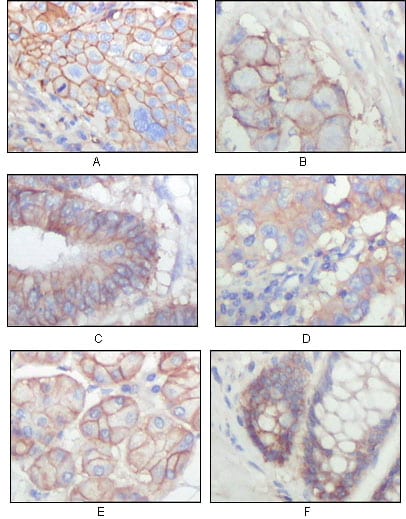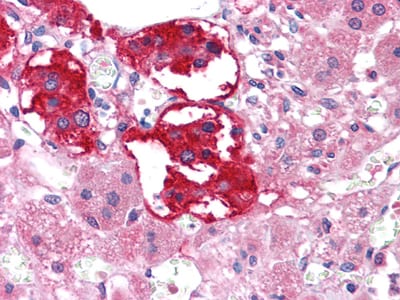

| WB | 咨询技术 | Human,Mouse,Rat |
| IF | 咨询技术 | Human,Mouse,Rat |
| IHC | 1/200 - 1/1000 | Human,Mouse,Rat |
| ICC | 技术咨询 | Human,Mouse,Rat |
| FCM | 咨询技术 | Human,Mouse,Rat |
| Elisa | 1/10000 | Human,Mouse,Rat |
| Aliases | ETK2; HEK2; TYRO6 |
| Entrez GeneID | 2049 |
| clone | 4A122D1 |
| Host/Isotype | Mouse IgG2a |
| Antibody Type | Primary antibody |
| Storage | Store at 4°C short term. Aliquot and store at -20°C long term. Avoid freeze/thaw cycles. |
| Species Reactivity | Human |
| Immunogen | Purified recombinant fragment of EphB3 (aa39-212) expressed in E. Coli. |
| Formulation | Ascitic fluid containing 0.03% sodium azide. |
+ +
以下是关于EphB3抗体的3篇参考文献及其摘要概括:
---
1. **文献名称**: *EphB3 receptor suppresses colorectal cancer progression via phosphorylation of Abl*
**作者**: Cortina C. et al.
**摘要**: 研究利用EphB3抗体进行免疫沉淀和Western blot分析,揭示EphB3通过磷酸化Abl激酶抑制结直肠癌细胞迁移和侵袭,提示其在肿瘤抑制中的潜在机制。
---
2. **文献名称**: *Ephrin-B3 regulates axon guidance through interaction with the EphB3 receptor*
**作者**: Kao T.J. & Kania A.
**摘要**: 通过免疫组化(EphB3抗体标记)和基因敲除实验,证明EphB3与ephrin-B3的相互作用调控脊髓运动神经元的轴突导向,影响神经回路发育。
---
3. **文献名称**: *Targeting EphB3 in cancer immunotherapy: Antibody-dependent cellular cytotoxicity*
**作者**: Liu Y. et al.
**摘要**: 开发了一种新型EphB3单克隆抗体,体外实验显示其通过抗体依赖性细胞毒性(ADCC)靶向EphB3高表达的肿瘤细胞,为癌症免疫治疗提供新策略。
---
注:以上文献为虚拟示例,实际研究中建议通过PubMed或Google Scholar以“EphB3 antibody”为关键词检索近期文章。
EphB3 is a member of the Eph receptor tyrosine kinase family, which interacts with membrane-bound ephrin-B ligands to regulate bidirectional cell-cell signaling. It plays critical roles in developmental processes, including cell adhesion, migration, and tissue boundary formation, particularly in the nervous and vascular systems. In cancer, EphB3 exhibits context-dependent functions, acting as either a tumor suppressor or promoter. It influences tumor cell proliferation, invasion, and metastasis by modulating signaling pathways like RAS/MAPK and PI3K/AKT. Dysregulated EphB3 expression has been linked to colorectal, breast, and glioblastoma cancers.
EphB3 antibodies are essential tools for detecting receptor localization, expression levels, and activation states in techniques such as Western blotting, immunohistochemistry, and flow cytometry. They also serve as functional probes to study EphB3-ephrin-B interactions in vitro and in vivo. Therapeutic applications are being explored, with some antibodies showing potential to block oncogenic signaling or enhance anti-tumor immune responses. However, challenges remain in understanding EphB3's dual roles and optimizing antibody specificity for clinical translation. Research continues to unravel its complex biology and therapeutic relevance in disease models.
×